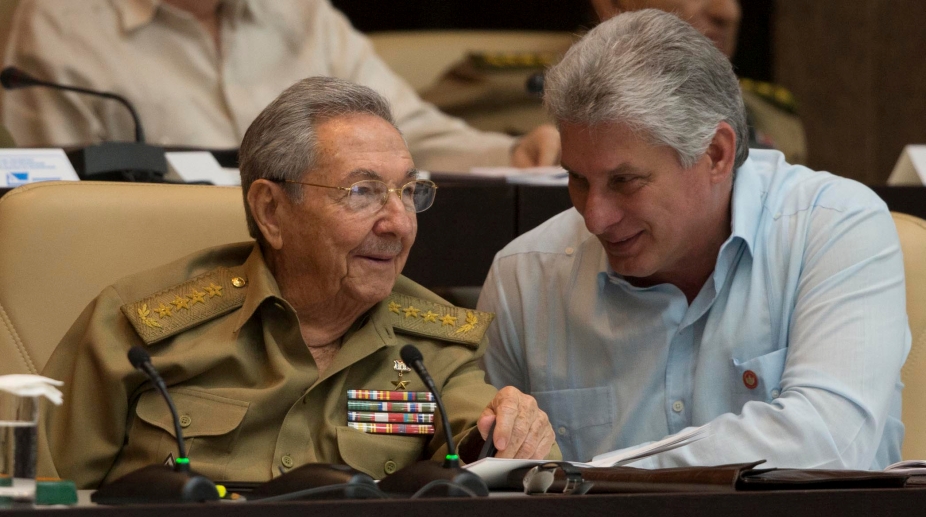Dictator’s template
A few decades back, a decreasing number of countries were given taints of autocracies and dictatorship (even though many were under undemocratic monarchies).

Raul Castro (L) talks with Miguel Diaz-Canel during the First Annual Session of the Cuban Parliament at the Convention Palace in Havana. (Photo: AFP )
Miguel Diaz-Canel is the new President of Cuba. No less profoundly, Thursday’s selection, indeed his elevation from the office of Vice-President, marks the end of the Castro era, a transition that is said to have been greeted by the average Cuban with a shrug.
Mr Diaz-Canel is the first Head of State from outside the Castro family who will be helming Cuba’s highest office in 60 years. However, it is a measure of the historical importance of the Castro family that as Raul Castro takes the bow at the ripe old age of 86, he will remain the head of the Communist party, the bedrock of governance.
Advertisement
This is concordant with the certitudes of the Constitution which defines the party as “the superior guiding force of society and the state”. As the party predominates over Cuba’s structure of governance, there is little doubt that Raul Castro will remain the most powerful person in Cuba for the time being, and will almost certainly preside over the legacy of his brother.
Advertisement
There is a degree of pregnant symbolism in his stepping down from the presidential pedestal in a country that has been accustomed to 60 years of absolute rule, first by the revolutionary leader, Fidel Castro and, for the past decade, his younger brother.
The new President will be expected to maintain the government’s grip on power in the face of economic stagnation, an ageing population, and increasing disenchantment among the younger generation as the Communist movement across the world bears witness to a burial of ideology.
No stranger to the compulsions of governance as Raul’s second-in-command, Mr Diaz-Canel has assessed the imperatives in a remarkably succinct manner ~ “We’re building a relationship between the government and the people here,” he told the National Assembly.
“The lives of those who will be elected have to be focused on relating to the people, listening to the people, investigating their problems and encouraging debate.”
He has been known to defend academics and bloggers who became targets of hardliners, leading some to describe him as a potential advocate for greater openness in a system that has traditionally been intolerant of virtually any criticism or dissent.
In the crucial perspective of the economy in a Communist country, Mr Diaz-Cenel succeeds to a depleted inheritance. If productivity is an index, Cuba’s Soviet-style command economy produces little.
The growth of the private sector has largely been frozen. Foreign investment is minimal and the island makes do with brittle infrastructure. And the average Cuban survives on a monthly salary of $31 ~ scarcely a living wage.
Hence the reports of stolen goods and handouts from relatives abroad. The country’s structural problems direly need to be addressed, a task that is of uppermost importance in President Díaz-Canel’s agenda… under the overarching supervision of Raul Castro.
Advertisement